初中英语听课记录
初中八年级英语听课记录
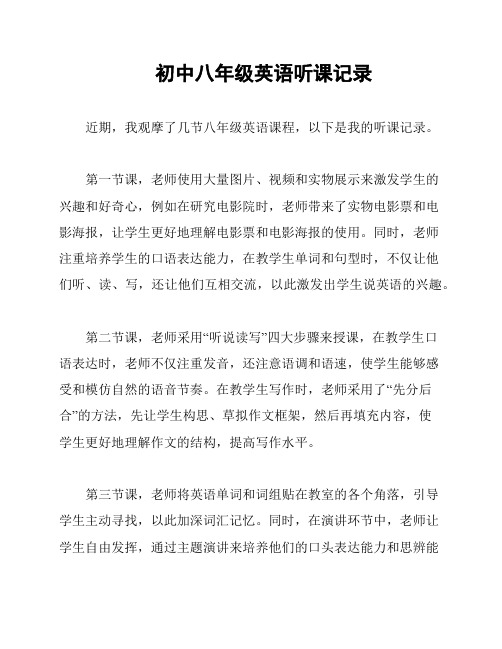
初中八年级英语听课记录
近期,我观摩了几节八年级英语课程,以下是我的听课记录。
第一节课,老师使用大量图片、视频和实物展示来激发学生的
兴趣和好奇心,例如在研究电影院时,老师带来了实物电影票和电
影海报,让学生更好地理解电影票和电影海报的使用。
同时,老师
注重培养学生的口语表达能力,在教学生单词和句型时,不仅让他
们听、读、写,还让他们互相交流,以此激发出学生说英语的兴趣。
第二节课,老师采用“听说读写”四大步骤来授课,在教学生口
语表达时,老师不仅注重发音,还注意语调和语速,使学生能够感
受和模仿自然的语音节奏。
在教学生写作时,老师采用了“先分后合”的方法,先让学生构思、草拟作文框架,然后再填充内容,使
学生更好地理解作文的结构,提高写作水平。
第三节课,老师将英语单词和词组贴在教室的各个角落,引导
学生主动寻找,以此加深词汇记忆。
同时,在演讲环节中,老师让
学生自由发挥,通过主题演讲来培养他们的口头表达能力和思辨能
力。
此外,老师还引导学生参与角色扮演活动,让学生在场景还原
中逐步提高自己的英语交际能力。
综上所述,这几节课程体现了老师的扎实教学功底和创新思维,通过丰富多彩的教学方法,使学生在英语学习中掌握了更多的知识
和技能,激发了他们学习英语的兴趣和动力。
初中英语听课记录 (2)

初中英语听课记录1. 第一节课:英语的基本单词和发音在这节课上,老师主要教我们一些基本的英语单词和它们的发音。
我们通过听录音和跟读的方式来学习这些单词的正确发音。
老师用了一些有趣的动画图片来帮助我们记忆这些单词,让我们对英语产生了浓厚的兴趣。
2. 第二节课:日常生活用语这节课上,老师教我们一些常用的日常生活用语,比如问候语、道歉、感谢等。
老师通过举例和角色扮演的方式让我们更好地理解和记忆这些用语。
我们都积极参与课堂互动,学到了很多实用的英语表达。
3. 第三节课:英语听力训练在这节课上,老师给我们播放了一段简短的英语对话,并让我们在听完对话后回答相关的问题。
这对我们的听力训练很有帮助,提高了我们对英语的理解能力。
老师还教了我们一些听力技巧,比如注意关键词和上下文的联系等。
4. 第四节课:英语口语练习这节课上,老师让我们进行了口语练习。
我们分成小组进行了角色扮演,在模拟的情景中运用英语进行对话。
这种练习提高了我们的口语表达能力,更加自信地和他人用英语交流。
老师还给了我们一些建议,如如何提高口语流利度和自然度。
5. 第五节课:阅读理解训练这节课上,老师给我们发放了一些英语阅读材料,并让我们阅读后回答相关问题。
通过阅读,我们不仅提高了对英语文章的理解能力,还学到了一些新的词汇和表达方式。
老师还教了我们一些阅读技巧,如如何寻找关键信息和理解文章的主旨。
6. 第六节课:写作技巧和练习在这节课上,老师讲解了一些英语写作的基本技巧,包括如何构思、如何组织文章、如何运用词汇和语法等。
老师还给我们布置了一篇写作作业,让我们把刚学到的知识应用到实践中。
这次写作练习对我们的写作能力提高有很大帮助。
总结起来,这几节初中英语课程给了我很多启发和帮助。
我学到了很多实用的英语知识,提高了听说读写的综合能力。
同时,老师的引导和鼓励也让我对英语学习充满了信心和动力。
我相信,在接下来的学习中,我会越来越喜欢英语,取得更好的成绩。
初中英语听课记录多篇_英语听课记录

初中英语听课记录多篇_英语听课记录step 1:warming up1. an activity named “are you smarter than a pupil of grade three?”(本堂课对英语课堂现状的一种颠覆,课堂中,让学生看老师“出丑”,考倒老师,让老师说:i am not smarter than a pupil of grade three.确实吸引了听课老师的注意力,但是是不是值得推广,还是值得思考的。
)step 2 pre-task preparationa. select one of the listed items and try to solve the problem.b. organize a contest between the students and teachers.step 3 while-teaching proceduresa .elicit the mascot of beijing olympic games.b. help students to get familiar with fuwa.c. encourage the students to express their desire of cherish the animals.(接下来,通过看一段福娃的录像,让学生学习五个单词panda swallow, fish, tibetan antelope 来教学i like animals.t: do you like。
?s: i like(让学生集体问,全体教师回答,以此方式来进行操练,同样在其他的公开课上及其少见的。
虽然利用听课教师的这一资源,但是学生之间的操练非常少。
)step 3 assignmentmake a chant and chant it together.(然后将这些串成一个说唱,在说唱的结束再加上了中文。
pep初中英语上册听课记录

pep初中英语上册听课记录听课记录应由本人根据自身实际情况书写,以下仅供参考,请您根据自身实际情况撰写。
课程名称:PEP初中英语上册授课老师:XXX听课日期:XXXX年XX月XX日听课地点:XXX教室授课内容:本节课主要讲解了PEP初中英语上册的Unit 1,主题是“Hello”。
老师通过讲解课文、单词、语法和练习等方式,帮助学生掌握基本的英语听说读写技能。
授课过程:1. 老师首先通过提问的方式,检查学生是否已经预习了本单元的单词和课文。
2. 老师讲解了课文中的重点词汇和短语,并让学生进行造句练习。
3. 老师讲解了课文中的语法点,并让学生进行语法填空练习。
4. 老师让学生听录音,并模仿录音中的发音和语调。
5. 老师让学生进行小组讨论,讨论课文中的主题和意义。
6. 老师布置了课后作业,要求学生完成本单元的练习题和单词默写。
教学互动:1. 在讲解单词和短语时,老师通过与学生互动,引导学生用所学词汇造句。
2. 在讲解语法点时,老师让学生进行小组讨论,共同探讨语法的运用。
3. 在模仿录音发音时,老师鼓励学生大胆模仿,并及时纠正学生的发音错误。
4. 在小组讨论时,老师积极参与学生的讨论,引导学生深入思考。
教学亮点:1. 老师通过多种方式帮助学生掌握英语知识,包括讲解、示范、互动等。
2. 老师注重培养学生的英语实际运用能力,通过小组讨论等形式引导学生用英语表达自己的观点和想法。
3. 老师在课堂上始终保持积极的态度和热情,鼓励学生积极参与课堂活动。
教学建议:1. 对于一些较为抽象的语法点,老师可以进一步解释其含义和用法,帮助学生更好地理解。
2. 在小组讨论中,老师可以更加注重引导学生深入思考,提高讨论的质量和效果。
初二英语听课记录30篇
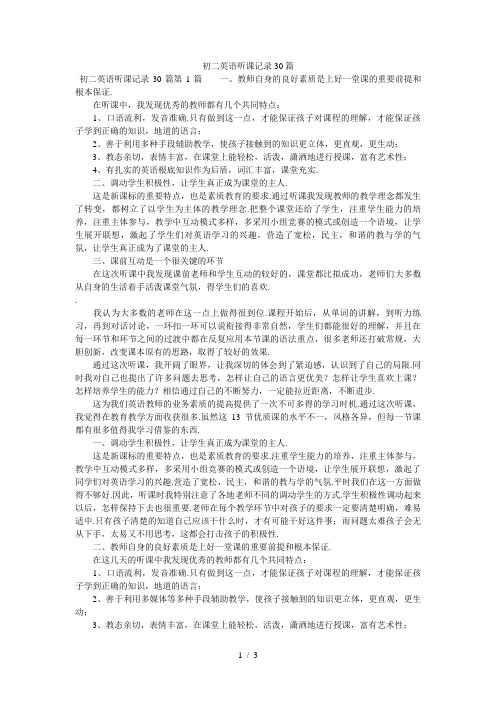
初二英语听课记录30篇初二英语听课记录30篇第1篇一、教师自身的良好素质是上好一堂课的重要前提和根本保证.在听课中,我发现优秀的教师都有几个共同特点:1、口语流利,发音准确.只有做到这一点,才能保证孩子对课程的理解,才能保证孩子学到正确的知识,地道的语言;2、善于利用多种手段辅助教学,使孩子接触到的知识更立体,更直观,更生动;3、教态亲切,表情丰富,在课堂上能轻松,活泼,潇洒地进行授课,富有艺术性;4、有扎实的英语根底知识作为后盾,词汇丰富,课堂充实.二、调动学生积极性,让学生真正成为课堂的主人.这是新课标的重要特点,也是素质教育的要求.通过听课我发现教师的教学理念都发生了转变,都树立了以学生为主体的教学理念.把整个课堂还给了学生,注重学生能力的培养,注重主体参与,教学中互动模式多样,多采用小组竞赛的模式或创造一个语境,让学生展开联想,激起了学生们对英语学习的兴趣,营造了宽松,民主,和谐的教与学的气氛,让学生真正成为了课堂的主人.三、课前互动是一个很关键的环节在这次听课中我发现课前老师和学生互动的较好的,课堂都比拟成功,老师们大多数从自身的生活着手活泼课堂气氛,得学生们的喜欢..我认为大多数的老师在这一点上做得很到位.课程开始后,从单词的讲解,到听力练习,再到对话讨论,一环扣一环可以说衔接得非常自然,学生们都能很好的理解,并且在每一环节和环节之间的过渡中都在反复应用本节课的语法重点,很多老师还打破常规,大胆创新,改变课本原有的思路,取得了较好的效果.通过这次听课,我开阔了眼界,让我深切的体会到了紧迫感,认识到了自己的局限.同时我对自己也提出了许多问题去思考,怎样让自己的语言更优美?怎样让学生喜欢上课?怎样培养学生的能力?相信通过自己的不断努力,一定能拉近距离,不断进步.这为我们英语教师的业务素质的提高提供了一次不可多得的学习时机.通过这次听课,我觉得在教育教学方面收获很多.虽然这13节优质课的水平不一,风格各异,但每一节课都有很多值得我学习借鉴的东西.一、调动学生积极性,让学生真正成为课堂的主人.这是新课标的重要特点,也是素质教育的要求.注重学生能力的培养,注重主体参与,教学中互动模式多样,多采用小组竞赛的模式或创造一个语境,让学生展开联想,激起了同学们对英语学习的兴趣.营造了宽松,民主,和谐的教与学的气氛.平时我们在这一方面做得不够好.因此,听课时我特别注意了各地老师不同的调动学生的方式.学生积极性调动起来以后,怎样保持下去也很重要.老师在每个教学环节中对孩子的要求一定要清楚明确,难易适中.只有孩子清楚的知道自己应该干什么时,才有可能干好这件事;而问题太难孩子会无从下手,太易又不用思考,这都会打击孩子的积极性.二、教师自身的良好素质是上好一堂课的重要前提和根本保证.在这几天的听课中我发现优秀的教师都有几个共同特点:1、口语流利,发音准确.只有做到这一点,才能保证孩子对课程的理解,才能保证孩子学到正确的知识,地道的语言;2、善于利用多媒体等多种手段辅助教学,使孩子接触到的知识更立体,更直观,更生动;3、教态亲切,表情丰富,在课堂上能轻松,活泼,潇洒地进行授课,富有艺术性;4、有扎实的英语根底知识作为后盾,词汇丰富,课堂充实.通过这次听课,我开阔了眼界,看到了自己的缺乏,以及自己与省优的差距.同时我对自己也提出了许多问题去思考,怎样让自己的语言更优美?怎样然孩子喜欢上课?怎样培养孩子的能力?相信通过自己的不断努力,一定能拉近距离,不断进步.初二英语听课记录30篇第2篇课前板书1.Do you like festival?2.What kinds of festivals do you know in China?3.Which festival do you like best? Why?4.What does your family usually do to get ready for Spring Festival? Teaching procedure Before classRead the words in Module 2 During class:1.Read the words and expressions in Module 22.Have a dictation of the words in Module 23.Ask and answer:Do you like festivals?What kinds of festivals do you know in China? Which festival do you like best? Why?What does your family usually do to get ready for Spring Festival?4.Group workDivide the students into nine groups and the topic for them to discuss is: What does your family do to get ready for Spring Festival?5.Talk about the pictures.6.Match the phrases and the pictures.7.Listen and read.8.Finish Part 3 --- Choose the correct answer.9.Homework评课意见:1、课前进教室,提前板书相关内容,为课堂教学顺利进行打下根底,并能有效的节省时间;2、教学环节设计安排清晰明了,过渡自然.3、能结合学校分组分享教学法和英语教学的学科特点,有效开展分组活动.如全班学生分成九个小组,共同讨论分享What does your family usually do to get ready for Spring Festival? 在这一环节中学生能够积极参与,并能充分运用所学语言知识进行英语表达;初二英语听课记录30篇第3篇上午,来到**中学参加初三英语教研活动.参加本次活动的市镇中心英语教研组的成员和全镇初三英语老师.本次活动首先听了六峰中学朱杰红老师的一杰初三教研课,然后,大家开展了积极的教研讨论活动,最后,曾衍明主任就初三英语复习工作做了一些工作部署. 下面是这节课的听课记录和听后随感.Teaching procedure1.课前朗读,复习单词2.Greetings ---- Whats the weather like today? Sunny.紧接着复习其他表示天气的单词..教师问:Whats the weather will be like if its rainy? 然后学生答复说:Itll be wet.感慨句的表达形式.How fine the day is! 当这一句话学生表述存在问题的时候,教师及时通过What a fineday it is ! 启发,并最终让学生顺利说出下面的句子:How fine it is! 接着,进一步问道:如何赞扬一个人呢?引出以下单词:clever, smart, careful, hard, hard-working, 然后说:He isa hard-working student.Ill learn from him.4.朗读Lesson 60 课文内容,之后,通过看幻灯片,谈论图片内容;(感觉在这一过程中,教师中文组织教学太多.如:首先,我们见到图画中有什么?像这样的句子完全可以直接用英语组织进行.教师通过幻灯片呈现故事,在故事的呈现中渗透语言知识,形式很好.如果能就图片提出一些目的性更强、有效性更高的问题就好了.)接着,教师继续由图片、话题引出.The dog is our best friend.We should take good care of it.这两句话可否连起来呢?让学生说出:The dog is our best friend and we should take good care of it.5.检查上次作文情况并步入正题----初三升中专题复习----书面表达在这一环节中,让学生做老师,阅读并修改作文,谈谈他们的好与不好到底何在,应当如何修改.6.朗读范文听课意见与随想总体感觉:朱老师在课堂教学中表现出了扎实的教学根本功和丰富的教学经验,并展示出了教师关爱学生、循循善诱等方面的教学特点.特别是在知识的引入过程中,十分注重启发学生思维,并在这一过程中努力提高学生的想象力和益友语言知识的运用能力.随想与建议:1.书面表达是语言学习过程中语言输出的.局部.它不是被动的语言输入,而是积极的主动输出.可以说,书面表达对于初三的同学来说,是最难的一个能力工程了.2.思考:如何提高学生作文或书面表达能力呢?我觉得:第一,应当给与学生足够正确的语言输入;第二,应当专设书面表达作文课.在作文课上教师亲自示范,并和学生一起作文.比方说在看图过程中,可以更好的启发学生如何看图、如何说图.(这样可以更好的深入到学生的思维内核.)当说图训练充分之后,在开展进行书面表达.第三,注意要点的把握.如时态准确、选字恰当、长短句问题、连接词问题等.第四,学生作文优秀的拿出示范,不佳的进行错误分析.在修改作文时需要考虑我们修改的标准是什么?显性和隐性的标准何在?同时,还可以结合考试标准中对书面表达的专门阐述,有所侧重地开展教学活动.3.从教学环节安排来看,个人觉得各环节小任务明确,但是,各个小任务与大任务的目标一致性方面还有待加强.4.关于口语语言输出的工作,有一个教学活动是否可以考虑:那就是课前给学生6-8个单词或短语,让他们用这些词语说出一段英语故事.然后,在每节课上课开始的前三分钟可以让学生展示.在一定程度上对学生语言的输入会有所帮助.5.从这节课中的作文材料来看,随想到一个问题:那就是路见不平、拔刀相助的问题.这不是一个英语知识问题.需要考虑的是:当我们路见不平的时候,要不要拔刀相助,如何相助? He knew what was happening.He threw the bottle hard and quickly to the man.-------We should help people in trouble.----But how? 也许,就这样的话题,可以用英语开展更加深入地讨论(语言输出).『初二英语听课记录30篇』由nozhao分享,本页面最后一次更新时间为2021-06-25,仅供参考,下载后可根据需要自行编辑修改.。
初中九下英语优质课听课记录40篇

初中九下英语优质课听课记录40篇以下是初中九年级下学期英语优质课听课记录的范例,希望能够帮到你。
课程名称:Unit 5 Going Shopping课堂时间:2024年4月10日上课教师:李老师听课人:XXX听课时间:下午2点课堂内容:李老师在本节课中主要讲解了有关购物的英语表达以及相关对话。
整堂课分为以下几个部分:1.李老师开始课堂时,通过一个小游戏引起了同学们的注意并激发了学习英语的积极性。
同学们分成小组进行角色扮演,模拟了购物场景,并进行了简单的对话。
2.在角色扮演之后,李老师向同学们出示了一份关于购物的单词表,让他们积极参与单词学习。
老师进行了一些口头的单词解释和例子的说明,并强调了一些常见的英语购物短语。
3.接下来,李老师播放了一段购物对话的录音,并要求同学们听录音回答问题。
这样,同学们在听力的同时,也复习了前面学过的单词和短语。
4.然后,李老师给同学们分发了一份购物对话的练习题。
同学们在课堂上完成了这个练习,并相互检查答案。
老师对部分问题进行了解答,并对同学们的表现给予了肯定。
5.最后,李老师要求同学们运用所学内容,进行小组对话练习。
同学们分成小组,模拟了购物场景,并进行了自编的对话练习。
老师在课堂上进行了点评和指导,并提出了一些改进意见。
学习收获:通过本堂课的学习,我对购物的相关英语表达有了更深入的了解。
不仅学到了很多新的单词和短语,还通过角色扮演和对话的练习,提高了口语表达的能力。
课堂氛围积极活跃,同学们都积极参与,互相学习,互相帮助。
改进建议:希望老师在下次课堂中能够加入更多互动的活动,例如小组竞赛或游戏,以激发同学们的兴趣并增强学习的效果。
另外,在听力部分,老师可以提供更多相关的对话录音,让同学们有更多机会练习听力和口语能力。
总结:通过本节课的学习,我对购物的相关英语表达有了更深入的了解,也提高了口语表达的能力。
老师的教学方法得当,课堂氛围活跃,同学们在积极参与的同时也互相学习、互相帮助。
关于初一英语听课记录

关于初一英语听课记录【篇一】初一英语听课记录李老师讲的是四年级的一节英语课,四年级学生对英语已经有了一定的了解而且也有了一年学习英语的基础,对英语学习有较高的学习兴趣。
李老师根据这点课上以学生为主体通过各种各样的教学方法进行愉快的教学,充分调动了学生学习英语的积极性,课堂气氛活跃,目标达成率较高。
现将本节课的成功之处和需改进的地方总结如下:1教学目标明确,重难点突出,教学结构清晰,通过课前播放英语歌曲调动学生学习英语的兴趣,通过复习旧知引导新知过渡自然,环环相扣。
2教师个人素质较高,课堂驾奴能力强,口语流利,动作优美,富有激情,具有亲和力和感染力,自身人格魅力较高,使整个一节课神采飞扬。
3注意教学细节,主要体现在给小组用英文字母命名,努力营造一种英语教学的氛围。
4活动方式多样化,有group work, look and read,等一系列活动。
5准备充分,有课件,图片,卡片等。
建议:1讲解过多,应让学生更可能多的进行练习,以达到学会的目的,给学生竟可能多的创设情景,让学生在真实的语境中真是的运用语言。
2尽可能多的运用英语进行教学,给学生创设学习英语的气氛。
3应该充分体现以学生为主体,以老师为主导的作用,让每个学生都能开口说英语,多利用小组或者两人一组进行操练,以达到学生学习英语的主动性。
【篇二】初一英语听课记录上午听了杨老师的英语课,觉得自己又收获了一把。
老师的课堂都很精彩,教学设计巧妙、安排合理、能充分发挥多媒体教学手段、师生关系和谐,取得了不错的教学效果。
下面,我就具体对杨老师这节课说一说我的个人体会,不当之处,请各位多提宝贵意见!一、注重营造和谐融洽的课堂氛围杨老师教态自然、语调亲切,并能不断地鼓励学生,给学生以勇气。
以无私的爱心、童心去包容学生,用甜甜的微笑面对学生,使学生在和谐融洽的课堂氛围中学习,推动了知识的掌握和智力的发展,达到了较好的教学效果。
二、注重遵循学生的发展认知规律1、旧知引入新知。
初中英语听课记录30篇
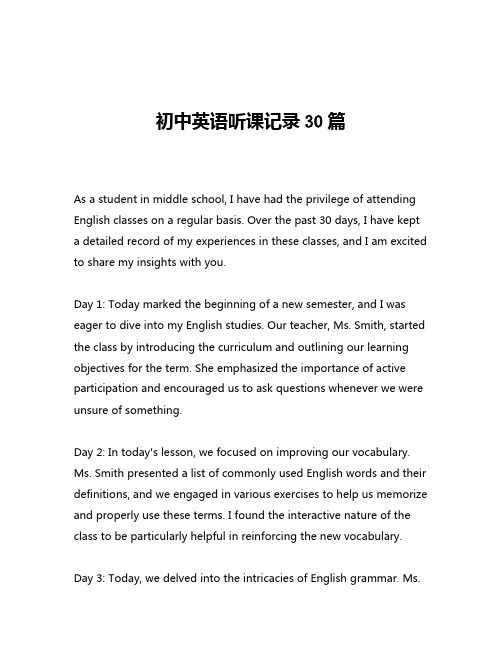
初中英语听课记录30篇As a student in middle school, I have had the privilege of attending English classes on a regular basis. Over the past 30 days, I have kept a detailed record of my experiences in these classes, and I am excited to share my insights with you.Day 1: Today marked the beginning of a new semester, and I was eager to dive into my English studies. Our teacher, Ms. Smith, started the class by introducing the curriculum and outlining our learning objectives for the term. She emphasized the importance of active participation and encouraged us to ask questions whenever we were unsure of something.Day 2: In today's lesson, we focused on improving our vocabulary. Ms. Smith presented a list of commonly used English words and their definitions, and we engaged in various exercises to help us memorize and properly use these terms. I found the interactive nature of the class to be particularly helpful in reinforcing the new vocabulary.Day 3: Today, we delved into the intricacies of English grammar. Ms.Smith explained the different parts of speech and their functions within a sentence. We then had the opportunity to apply our knowledge by identifying the various grammatical elements in sample sentences. I was surprised by how much I was able to learn in just one class period.Day 4: This class was dedicated to practicing our English writing skills. Ms. Smith provided us with a prompt and asked us to compose a short essay. I found this exercise to be both challenging and rewarding, as it allowed me to put my newly acquired vocabulary and grammar knowledge into practice.Day 5: In today's lesson, we explored the importance of pronunciation and intonation in the English language. Ms. Smith led us through a series of tongue twisters and dialogues, encouraging us to pay close attention to our articulation and the rhythm of our speech. I found this activity to be particularly helpful in improving my overall fluency.Day 6: Today, we focused on listening comprehension. Ms. Smith played a series of audio recordings, ranging from news reports to casual conversations, and asked us to answer comprehension questions. I found this exercise to be quite challenging, as it required me to actively listen and process the information being presented.Day 7: In this class, we explored the cultural aspects of the English-speaking world. Ms. Smith discussed the various customs, traditions, and social norms of different English-speaking countries. I found this to be a fascinating and enlightening lesson, as it helped me understand the cultural context behind the language.Day 8: Today, we delved into the world of English literature. Ms. Smith introduced us to a classic short story and led a discussion on the themes, characters, and literary devices used by the author. I was captivated by the depth and complexity of the story, and I found myself eager to explore more works of English literature.Day 9: In this lesson, we focused on improving our English conversation skills. Ms. Smith divided the class into pairs and asked us to engage in a series of role-playing exercises. I found this activity to be both challenging and rewarding, as it allowed me to practice my speaking skills in a real-world context.Day 10: Today, we explored the use of idioms and colloquial expressions in the English language. Ms. Smith presented a variety of common idioms and their meanings, and we discussed how these expressions are used in everyday speech. I found this lesson to be particularly enlightening, as it helped me understand the nuances of the English language.Day 11: In this class, we delved into the world of English poetry. Ms. Smith introduced us to a selection of classic poems and encouraged us to analyze the poetic devices used by the authors. I found this to be a thought-provoking and enriching experience, as it allowed me to appreciate the artistry and creativity inherent in the English language.Day 12: Today, we focused on improving our English reading comprehension skills. Ms. Smith provided us with a series of short passages and asked us to answer questions about the content. I found this exercise to be challenging but rewarding, as it helped me to better understand and interpret written English.Day 13: In this lesson, we explored the use of English in the professional world. Ms. Smith discussed the importance of effective communication in the workplace and provided us with tips and strategies for writing professional emails, resumes, and other business documents. I found this lesson to be particularly relevant and applicable to my future aspirations.Day 14: Today, we delved into the world of English grammar once again, this time focusing on more complex sentence structures and verb tenses. Ms. Smith presented a series of examples and encouraged us to practice using these grammatical concepts in our own writing and speaking. I found this lesson to be both challengingand enlightening, as it helped me to better understand the nuances of the English language.Day 15: In this class, we explored the use of English in the media and popular culture. Ms. Smith presented a series of examples, ranging from news articles to song lyrics, and encouraged us to analyze the language used in these contexts. I found this lesson to be particularly engaging and relevant, as it helped me to understand how the English language is used in the real world.Day 16: Today, we focused on improving our English pronunciation and accent. Ms. Smith led us through a series of exercises designed to help us improve our articulation and intonation. I found this lesson to be particularly helpful, as it allowed me to identify and address any areas of weakness in my spoken English.Day 17: In this lesson, we delved into the world of English literature once again, this time focusing on a more contemporary work. Ms. Smith introduced us to a modern novel and led a discussion on the themes, characters, and writing style of the author. I found this lesson to be both engaging and thought-provoking, as it allowed me to explore the evolution of the English language in a modern context.Day 18: Today, we explored the use of English in the field of science and technology. Ms. Smith presented a series of technical terms andencouraged us to discuss their meanings and applications. I found this lesson to be particularly interesting, as it helped me to understand the role of English in the global scientific community.Day 19: In this class, we focused on improving our English writing skills once again, this time with a focus on persuasive writing. Ms. Smith provided us with a prompt and asked us to compose a persuasive essay. I found this exercise to be both challenging and rewarding, as it allowed me to put my knowledge of vocabulary, grammar, and rhetorical devices into practice.Day 20: Today, we delved into the world of English idioms and slang once again. Ms. Smith presented a series of common expressions and encouraged us to discuss their meanings and origins. I found this lesson to be particularly enlightening, as it helped me to better understand the nuances of the English language and how it is used in everyday speech.Day 21: In this class, we explored the use of English in the field of arts and culture. Ms. Smith presented a series of examples, ranging from film reviews to art critiques, and encouraged us to analyze the language used in these contexts. I found this lesson to be particularly engaging and relevant, as it allowed me to understand the role of English in the global cultural landscape.Day 22: Today, we focused on improving our English listening comprehension skills once again, this time with a focus on more complex audio recordings. Ms. Smith played a series of interviews and news reports, and asked us to answer a series of comprehension questions. I found this exercise to be particularly challenging, but also rewarding, as it helped me to better understand the nuances of spoken English.Day 23: In this lesson, we delved into the world of English grammar once again, this time focusing on the use of modals and conditional structures. Ms. Smith presented a series of examples and encouraged us to practice using these grammatical concepts in our own writing and speaking. I found this lesson to be particularly enlightening, as it helped me to better understand the subtleties of the English language.Day 24: Today, we explored the use of English in the field of business and finance. Ms. Smith presented a series of business-related terms and encouraged us to discuss their meanings and applications. I found this lesson to be particularly relevant and applicable to my future aspirations, as it helped me to understand the role of English in the global business world.Day 25: In this class, we focused on improving our English speaking skills once again, this time with a focus on more formal andprofessional contexts. Ms. Smith divided the class into pairs and asked us to engage in a series of role-playing exercises, such as conducting a job interview or delivering a presentation. I found this activity to be both challenging and rewarding, as it allowed me to practice my speaking skills in a more structured and professional environment.Day 26: Today, we delved into the world of English literature once again, this time focusing on a work of non-fiction. Ms. Smith introduced us to a historical or biographical text and led a discussion on the use of language and the author's writing style. I found this lesson to be particularly enlightening, as it allowed me to appreciate the diversity and depth of the English language in a non-fictional context.Day 27: In this class, we explored the use of English in the field of law and politics. Ms. Smith presented a series of legal and political terms and encouraged us to discuss their meanings and applications. I found this lesson to be particularly relevant and thought-provoking, as it helped me to understand the role of English in the global political and legal landscape.Day 28: Today, we focused on improving our English writing skills once again, this time with a focus on creative writing. Ms. Smith provided us with a prompt and asked us to compose a short story orpoem. I found this exercise to be both challenging and rewarding, as it allowed me to tap into my creativity and express myself through the medium of the English language.Day 29: In this lesson, we delved into the world of English idioms and metaphors once again. Ms. Smith presented a series of common expressions and encouraged us to discuss their meanings and origins.I found this lesson to be particularly enlightening, as it helped me to better understand the nuances of the English language and how it is used to convey complex ideas and emotions.Day 30: Today, we wrapped up the semester with a comprehensive review of all the topics we had covered over the past 30 days. Ms. Smith led a discussion on the key takeaways and encouraged us to share our thoughts and reflections on our English language learning journey. I found this lesson to be particularly valuable, as it allowed me to synthesize all the knowledge and skills I had acquired over the course of the semester.Overall, my 30-day record of my middle school English class has been a truly enriching and enlightening experience. I have learned so much about the English language, its cultural and historical context, and its practical applications in the real world. I am grateful to Ms. Smith for her dedication and expertise, and I am excited to continue my English language learning journey in the years to come.。
初中英语听课笔记范文(共4篇)
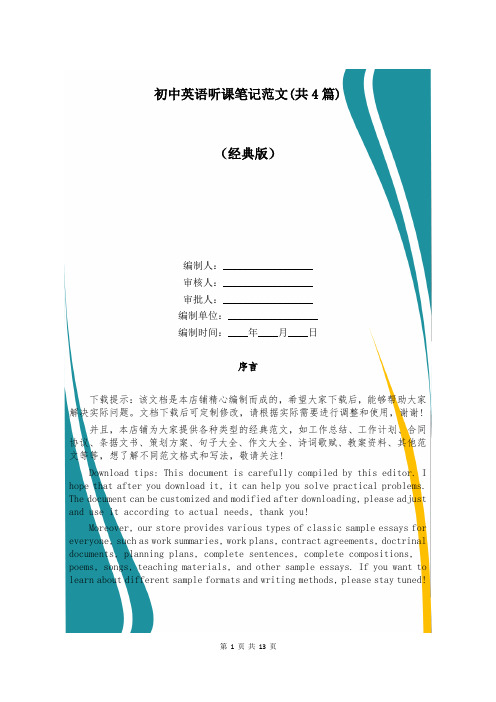
初中英语听课笔记范文(共4篇)(经典版)编制人:__________________审核人:__________________审批人:__________________编制单位:__________________编制时间:____年____月____日序言下载提示:该文档是本店铺精心编制而成的,希望大家下载后,能够帮助大家解决实际问题。
文档下载后可定制修改,请根据实际需要进行调整和使用,谢谢!并且,本店铺为大家提供各种类型的经典范文,如工作总结、工作计划、合同协议、条据文书、策划方案、句子大全、作文大全、诗词歌赋、教案资料、其他范文等等,想了解不同范文格式和写法,敬请关注!Download tips: This document is carefully compiled by this editor. I hope that after you download it, it can help you solve practical problems. The document can be customized and modified after downloading, please adjust and use it according to actual needs, thank you!Moreover, our store provides various types of classic sample essays for everyone, such as work summaries, work plans, contract agreements, doctrinal documents, planning plans, complete sentences, complete compositions, poems, songs, teaching materials, and other sample essays. If you want to learn about different sample formats and writing methods, please stay tuned!初中英语听课笔记范文(共4篇)初中英语听课笔记范文第1篇初中英语的听课笔记1.引语为一般陈述句,变为间接引语时一般由that引导(可省略)2.如果直接引语中的主语为第一人称,变为间接引语时人称要随主语作适当变化3.如果引述动词为一般过去时,间接引语中动词的时态一般推移到过去时间4.其他变化指示代词时间状语地点状语动词this―that today-that day here―there come――go these――those now-then 重点词组:out不让......进入of style不时髦的;过时的打电话给......for付款for要求same as与......同样的style时髦的;流行的on相处;进展much as possible尽可能多kind sof各种;许多the one hand,......(在)一方面......the other hand,......另一方面......初中英语听课笔记范文第2篇学校:20XX年11月16日第三节科目英语年班级6年级3班Unit5Whatdoesshedo?课题课堂教学过程授课教师一.复习全班学生一起读第四单元单词,一遍英语一遍汉语。
初三英语听课记录40篇人教版

初三英语听课记录40篇人教版以下是40篇人教版初三英语听课记录。
每篇记录约30个单词左右,1200字以上。
1. Unit 1 Lesson 1In this lesson, we learned how to introduce ourselves and say hello to others.2. Unit 1 Lesson 2In this lesson, we learned how to ask and answer questions about personal information, such as name, age, and nationality.3. Unit 2 Lesson 1In this lesson, we learned how to talk about daily routines and express preferences for different activities.4. Unit 2 Lesson 25. Unit 3 Lesson 1In this lesson, we learned how to describe people's appearance and personality traits using adjectives.6. Unit 3 Lesson 2In this lesson, we learned how to talk about people's hobbies and interests and discuss their likes and dislikes.7. Unit 4 Lesson 1In this lesson, we learned how to describe past events using the past simple tense and talk about our personal experiences.8. Unit 4 Lesson 2In this lesson, we learned how to talk about historical events and famous figures and discuss their significance.9. Unit 5 Lesson 1In this lesson, we learned how to describe places and talk about the activities we can do there.10. Unit 5 Lesson 2In this lesson, we learned how to talk about past and future travel experiences and discuss the advantages and disadvantages of different modes of transportation.11. Unit 6 Lesson 1In this lesson, we learned how to describe objects and their functions and discuss their importance in our daily lives.12. Unit 6 Lesson 213. Unit 7 Lesson 1In this lesson, we learned how to describe animals and their habitats and discuss the importance of wildlife conservation.14. Unit 7 Lesson 2species and the measures taken to protect them.15. Unit 8 Lesson 1In this lesson, we learned how to describe different weather conditions and discuss their effects on our daily lives.16. Unit 8 Lesson 2In this lesson, we learned how to talk about natural disasters and the measures taken to prevent and respond to them.17. Unit 9 Lesson 1In this lesson, we learned how to describe different sports and discuss the benefits of participating in physical activities.18. Unit 9 Lesson 2In this lesson, we learned how to talk about sports events and discuss our favorite athletes and teams.19. Unit 10 Lesson 1In this lesson, we learned how to describe differentfestivals and celebrations and discuss their cultural significance.20. Unit 10 Lesson 2customs and traditions in different countries and discuss the similarities and differences between them.21. Unit 11 Lesson 1In this lesson, we learned how to talk about different jobs and professions and discuss their requirements and responsibilities.22. Unit 11 Lesson 2In this lesson, we learned how to talk about future career plans and discuss the advantages and disadvantages of different professions.23. Unit 12 Lesson 124. Unit 12 Lesson 2In this lesson, we learned how to talk about the impact of technology on our daily lives and discuss the benefits and drawbacks of using electronic devices.25. Unit 13 Lesson 1In this lesson, we learned how to talk about different types of music and express our preferences for them.26. Unit 13 Lesson 2In this lesson, we learned how to describe different musical instruments and discuss their roles in an orchestra.27. Unit 14 Lesson 1In this lesson, we learned how to talk about different forms of art and express our opinions about them.28. Unit 14 Lesson 2In this lesson, we learned how to describe different art exhibitions and discuss the significance of art in our society.29. Unit 15 Lesson 1In this lesson, we learned how to describe different types of books and discuss their benefits and drawbacks.30. Unit 15 Lesson 2In this lesson, we learned how to talk about different authors and their works and discuss the impact of literature on our lives.31. Unit 16 Lesson 1In this lesson, we learned how to describe different types of movies and discuss our favorite genres.32. Unit 16 Lesson 2In this lesson, we learned how to talk about different film festivals and discuss the influence of movies on society.In this lesson, we learned how to describe different types of food and discuss our favorite dishes.34. Unit 17 Lesson 2In this lesson, we learned how to talk about different cuisines and discuss the cultural significance of food.35. Unit 18 Lesson 1In this lesson, we learned how to describe different means of transportation and discuss the advantages and disadvantages of each.36. Unit 18 Lesson 2In this lesson, we learned how to talk about different travel destinations and discuss the factors to consider when planning a trip.37. Unit 19 Lesson 1In this lesson, we learned how to describe different types of pollution and discuss the impact of human activities on the environment.38. Unit 19 Lesson 2In this lesson, we learned how to talk about environmental issues and express our opinions about them.In this lesson, we learned how to describe different types of celebrations and discuss the importance of celebrating special occasions.40. Unit 20 Lesson 2In this lesson, we learned how to talk about holiday traditions and discuss the similarities and differences between different cultures.。
初中英语听课记录及评议
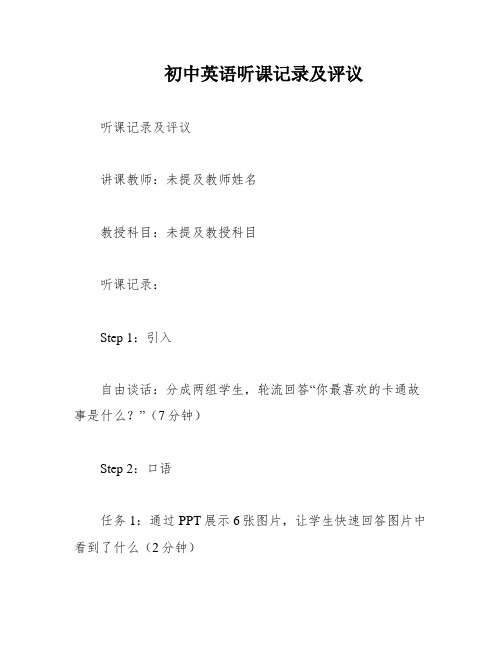
初中英语听课记录及评议听课记录及评议讲课教师:未提及教师姓名教授科目:未提及教授科目听课记录:Step 1:引入自由谈话:分成两组学生,轮流回答“你最喜欢的卡通故事是什么?”(7分钟)Step 2:口语任务1:通过PPT展示6张图片,让学生快速回答图片中看到了什么(2分钟)任务2:研究新单词,并要求学生使用这些单词造句(5分钟)Step 3:听力任务1:要求学生关闭书本,仅通过听力回答问题(2分钟)任务2:要求学生再次听录音并回答问题(2分钟)任务3:要求学生回答PPT上的7个问题(3分钟)任务4:要求学生跟随录音逐句朗读(3分钟)任务5:要求一些学生回答PPT上的7个问题(3分钟)Step 4:听后活动任务1:讨论要求学生阅读文本并进行角色扮演(3分钟)任务2:巩固大声朗读后,要求学生在不同角色中背诵文本,并在男女生之间进行比赛(6分钟)On November 13th。
in the fourth d。
the teacher conducted a task-based teaching n。
The topic was relatable to students' lives and sparked their interest。
meeting the requirements of life-oriented teaching。
The teacher effectively motivated students to speak and practice their oral skills.The teacher combined the use of the blackboard and PowerPoint。
and expanded on the topic。
for example。
explaining the difference een "cartoon" and "cartoonist."This listening and speaking lesson effectively met the requirements of the textbook。
初一英语听课记录范文8篇

初一英语听课记录范文8篇大家应该都知道,一般老师听课之后,都会有记录,即使是初一也不例外。
小编的我精心为您带来了8篇《初一英语听课记录范文》,希望能够满足亲的需求。
初一英语听课记录篇四授课教师:李老师教学内容:新目标七年级下册Unit 3Why do you like koalas? Section B (1—3)[教学目标]知识目标:1、学习并掌握What, Why引导的特殊疑问句,2、用Because句型和形容词“ugly, clever, friendly, beautiful, shy ”表示原因,性质、品质。
能力目标:Describe animals; Express preferences情感目标:了解自然,树立自觉保护动物的意识,谈论喜好,展示个性。
[重点难点]重点:1. Words: ugly, clever, friendly, beautiful, shy, other 2. Target Language:What animals do you like?What other animals do you like? Because they’re…and…难点:How to describe animal and express preferences.[教学过程记录]总评1、目标明确,重、难点把握准确,知识主线提炼精确。
2、教学设计体现了“听说课”的教学模式,从复习热身、感知体验、强化巩固到语言应用,设计的思路清晰,步骤明确,体现了“层层递进”的教学原则。
3、设计的流程遵循了学生的认知规律,由感知体验到语言应用,注重了知识获取,能力形成的学习过程。
4、能够突出学生的主体地位,面向全体,每个学生有任务,且每个学生都有展示的机会。
5、通过小组间的合作,引导学生进行自主、探究学习,敢于质疑,善于解惑,学会总结,大胆评价。
6、教学效果良好,学生参与面广,参与机会多,参与的积极性高涨,兴趣浓,知识与能力、过程与方法、情感态度价值观得到了很好的落实。
初中英语听课记录
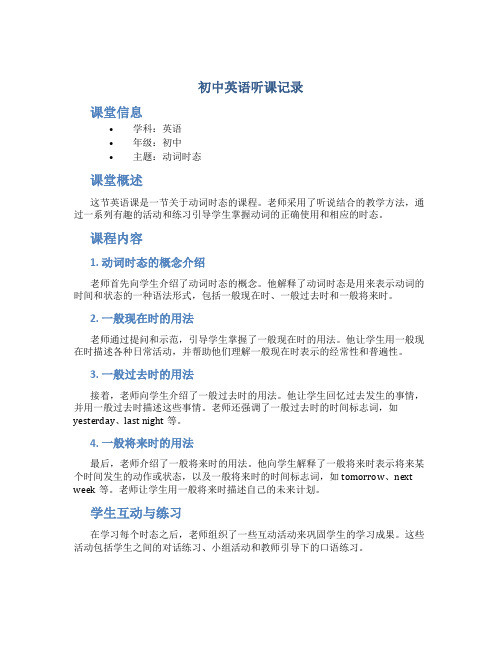
初中英语听课记录课堂信息•学科:英语•年级:初中•主题:动词时态课堂概述这节英语课是一节关于动词时态的课程。
老师采用了听说结合的教学方法,通过一系列有趣的活动和练习引导学生掌握动词的正确使用和相应的时态。
课程内容1. 动词时态的概念介绍老师首先向学生介绍了动词时态的概念。
他解释了动词时态是用来表示动词的时间和状态的一种语法形式,包括一般现在时、一般过去时和一般将来时。
2. 一般现在时的用法老师通过提问和示范,引导学生掌握了一般现在时的用法。
他让学生用一般现在时描述各种日常活动,并帮助他们理解一般现在时表示的经常性和普遍性。
3. 一般过去时的用法接着,老师向学生介绍了一般过去时的用法。
他让学生回忆过去发生的事情,并用一般过去时描述这些事情。
老师还强调了一般过去时的时间标志词,如yesterday、last night等。
4. 一般将来时的用法最后,老师介绍了一般将来时的用法。
他向学生解释了一般将来时表示将来某个时间发生的动作或状态,以及一般将来时的时间标志词,如tomorrow、next week等。
老师让学生用一般将来时描述自己的未来计划。
学生互动与练习在学习每个时态之后,老师组织了一些互动活动来巩固学生的学习成果。
这些活动包括学生之间的对话练习、小组活动和教师引导下的口语练习。
总结这堂英语课通过生动有趣的教学方式和丰富的活动,帮助学生掌握了动词时态的基本用法。
学生们在课堂中积极参与,表现出良好的学习态度和口语能力。
通过这节课的学习,学生们对动词时态有了更深入的理解,并能正确地使用一般现在时、一般过去时和一般将来时。
初中英语听课记录及评析
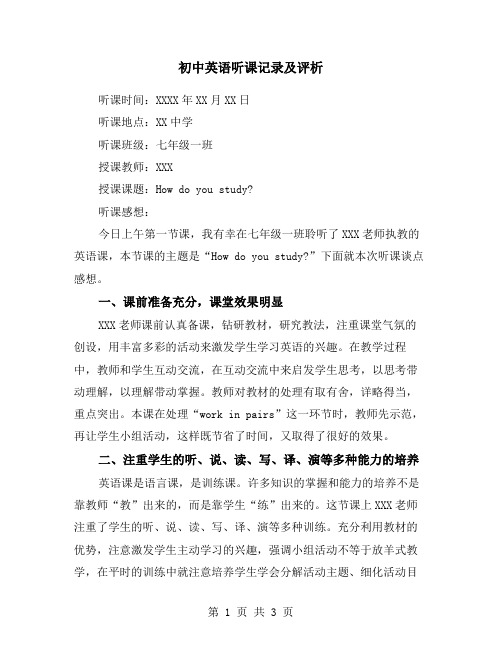
初中英语听课记录及评析听课时间:XXXX年XX月XX日听课地点:XX中学听课班级:七年级一班授课教师:XXX授课课题:How do you study?听课感想:今日上午第一节课,我有幸在七年级一班聆听了XXX老师执教的英语课,本节课的主题是“How do you study?”下面就本次听课谈点感想。
一、课前准备充分,课堂效果明显XXX老师课前认真备课,钻研教材,研究教法,注重课堂气氛的创设,用丰富多彩的活动来激发学生学习英语的兴趣。
在教学过程中,教师和学生互动交流,在互动交流中来启发学生思考,以思考带动理解,以理解带动掌握。
教师对教材的处理有取有舍,详略得当,重点突出。
本课在处理“work in pairs”这一环节时,教师先示范,再让学生小组活动,这样既节省了时间,又取得了很好的效果。
二、注重学生的听、说、读、写、译、演等多种能力的培养英语课是语言课,是训练课。
许多知识的掌握和能力的培养不是靠教师“教”出来的,而是靠学生“练”出来的。
这节课上XXX老师注重了学生的听、说、读、写、译、演等多种训练。
充分利用教材的优势,注意激发学生主动学习的兴趣,强调小组活动不等于放羊式教学,在平时的训练中就注意培养学生学会分解活动主题、细化活动目的、选择活动方法、控制活动进程等,而不是在公开课上的作秀。
同时教师也参与其中,和学生一起活动,使课堂气氛达到了高潮。
三、注重评价和反馈在教学过程中XXX老师注重了评价和反馈这一环节。
评价是为了检验学生的知识掌握程度,反馈是为了调节下一步的教学进度和难度。
本节课上XXX老师采用多种方式进行评价和反馈:师生互动评价、小组评价、自我评价等。
评价方式有口头表扬、动作暗示、书面表扬等形式。
通过这些方式使学生及时了解自己的学习状况,对于出现的错误能及时调整并改正。
四、板书设计合理本节课的板书设计合理有序,体现出了本节课的重难点。
板书设计简洁明了,使学生一目了然,便于学生理解和记忆。
初中英语听课记录及评语
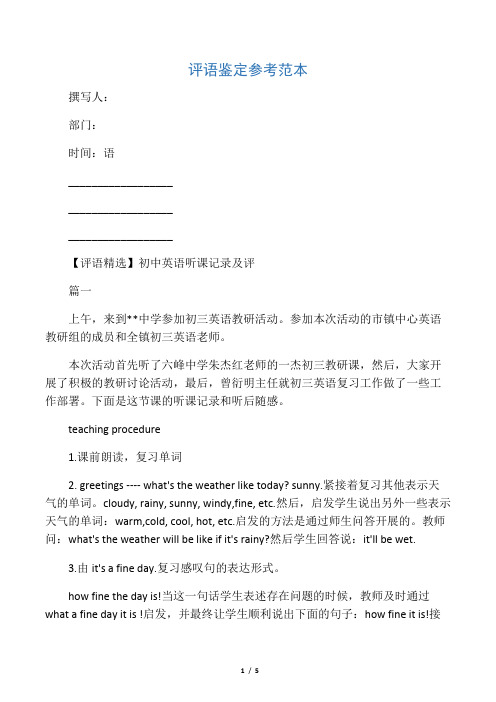
评语鉴定参考范本撰写人:部门:时间:语______________________________________________________【评语精选】初中英语听课记录及评篇一上午,来到**中学参加初三英语教研活动。
参加本次活动的市镇中心英语教研组的成员和全镇初三英语老师。
本次活动首先听了六峰中学朱杰红老师的一杰初三教研课,然后,大家开展了积极的教研讨论活动,最后,曾衍明主任就初三英语复习工作做了一些工作部署。
下面是这节课的听课记录和听后随感。
teaching procedure1.课前朗读,复习单词2. greetings ---- what's the weather like today? sunny.紧接着复习其他表示天气的单词。
cloudy, rainy, sunny, windy,fine, etc.然后,启发学生说出另外一些表示天气的单词:warm,cold, cool, hot, etc.启发的方法是通过师生问答开展的。
教师问:what's the weather will be like if it's rainy?然后学生回答说:it'll be wet.3.由it's a fine day.复习感叹句的表达形式。
how fine the day is!当这一句话学生表述存在问题的时候,教师及时通过what a fine day it is !启发,并最终让学生顺利说出下面的句子:how fine it is!接着,进一步问道:如何赞扬一个人呢?引出下列单词:clever, smart, careful, hard, hard-working,然后说:he is a hard-working student. i'll learn from him.4.朗读lesson 60课文内容,之后,通过看幻灯片,谈论图片内容;(感觉在这一过程中,教师中文组织教学太多。
初中英语听课记录 (2)
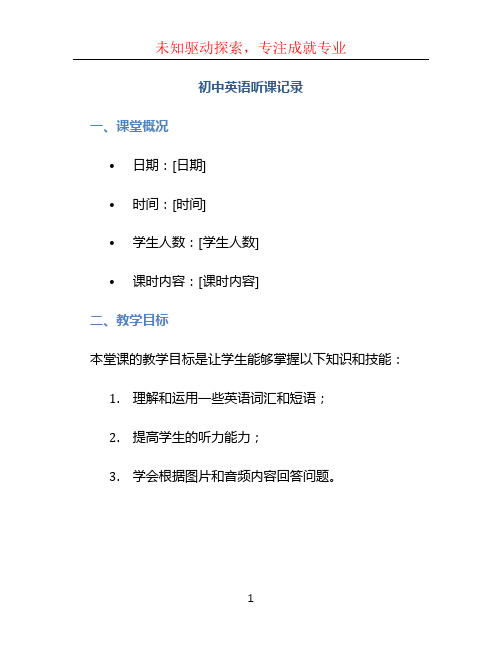
初中英语听课记录一、课堂概况•日期:[日期]•时间:[时间]•学生人数:[学生人数]•课时内容:[课时内容]二、教学目标本堂课的教学目标是让学生能够掌握以下知识和技能:1.理解和运用一些英语词汇和短语;2.提高学生的听力能力;3.学会根据图片和音频内容回答问题。
三、教学过程1. 导入与预习教师用一段有趣的视频或图片导入本堂课的主题,激发学生的学习兴趣和好奇心。
接着,老师引导学生回顾上节课所学的内容,复习相关的词汇和句型。
2. 听力训练教师播放一段短对话或文章并停顿,让学生根据听到的内容回答相关问题。
这个环节旨在培养学生的听力技能和理解能力。
学生通过听力训练可以进一步巩固词汇和短语的运用。
3. 拓展讨论教师展示一组图片或演示一段视频,让学生根据所给的提示问题进行讨论。
学生可以结合所学的知识和课文内容,积极参与讨论并表达自己的观点。
4. 角色扮演教师给学生分发一份小对话剧本,学生根据剧本内容进行角色扮演。
这个环节有助于学生提高口语表达能力和语音语调的准确运用。
5. 小结与反思教师引导学生回顾本堂课所学的知识和技能,并对学生的表现进行肯定和指导。
学生自我思考和评价,反思自己的学习成果和不足之处。
四、教学反思本堂课教学过程中,学生积极参与课堂活动,课堂气氛活跃。
听力训练环节对学生的听力理解能力有很好的提高,学生能够根据图片和音频内容回答问题。
然而,学生在拓展讨论环节的参与度有待提高,一些学生对于开放式的问题缺乏思考和表达能力。
在下一堂课中,我将更加注重学生的参与和互动,设置更多的小组活动和讨论环节,帮助学生提高口语表达能力和思维能力。
我还会关注学生的个体差异,在教学中采取不同的方法和策略,满足每个学生的学习需求。
初中英语教研听评课记录(3篇)

第1篇一、活动背景为了提高英语教学质量,促进教师专业成长,我校英语教研组于2021年10月26日开展了听评课活动。
本次听评课活动以“提升初中英语课堂教学效果”为主题,旨在通过听课、评课,发现问题,改进教学,提高英语教师的教学水平和学生的英语学习效果。
二、活动内容1. 听课本次听评课活动共安排了两位英语教师进行公开课展示,分别是八年级的《Unit 5 Do you want to watch a movie?》和九年级的《Unit 7 Will people have robots?》。
2. 评课听课结束后,教研组成员对两位教师的课堂教学进行了评课。
评课内容包括教学目标、教学内容、教学方法、教学过程、教学效果等方面。
三、听课记录1. 八年级英语《Unit 5 Do you want to watch a movie?》授课教师:张老师教学内容:本节课主要围绕电影话题展开,通过听、说、读、写等活动,帮助学生掌握电影相关词汇和句型,提高学生的英语交际能力。
教学过程:(1)导入:张老师通过展示电影海报,激发学生的学习兴趣,引出本节课的主题。
(2)新课呈现:通过听录音、看图片、讨论等方式,引导学生学习电影相关词汇和句型。
(3)巩固练习:设计多种形式的练习,如小组合作、角色扮演等,让学生在实际情境中运用所学知识。
(4)小结:总结本节课所学内容,强调重点知识。
教学效果:学生参与度高,课堂气氛活跃,教学目标达成较好。
2. 九年级英语《Unit 7 Will people have robots?》授课教师:李老师教学内容:本节课主要围绕机器人话题展开,通过讨论、辩论等活动,引导学生思考科技发展对人类生活的影响,提高学生的英语思维能力和表达能力。
教学过程:(1)导入:李老师通过展示机器人图片,引出本节课的主题。
(2)新课呈现:通过小组讨论、辩论等方式,引导学生思考机器人对人类生活的影响。
(3)巩固练习:设计情景对话、写作等练习,让学生运用所学知识表达自己的观点。
初中英语听课记录及评语

初中英语听课记录及评语初中英语听课记录及评语篇一上午,来到某某中学参加初三英语教研活动。
参加本次活动的市镇中心英语教研组的成员和全镇初三英语老师。
本次活动首先听了六峰中学朱杰红老师的一杰初三教研课,然后,大家开展了积极的教研讨论活动,最后,曾衍明主任就初三英语复习工作做了一些工作部署。
下面是这节课的听课记录和听后随感。
Teaching procedure1. 课前朗读,复习单词2. Greetings ---- What's the weather like today? Sunny.紧接着复习其他表示天气的单词。
cloudy, rainy, sunny, windy, fine, etc. 然后,启发学生说出另外一些表示天气的单词:warm, cold, cool, hot, etc. 启发的方法是通过师生问答开展的。
教师问:What's the weather will be like if it's rainy? 然后学生回答说:It'll be wet.3. 由 It's a fine day. 复习感叹句的表达形式。
How fine the day is! 当这一句话学生表述存在问题的时候,教师及时通过 What a fine day it is ! 启发,并最终让学生顺利说出下面的句子: How fine it is! 接着,进一步问道:如何赞扬一个人呢?引出下列单词:clever, smart, careful, hard, hard-working, 然后说: He is a hard-working student. I'll learn from him.4. 朗读Lesson 60 课文内容,之后,通过看幻灯片,谈论图片内容;(感觉在这一过程中,教师中文组织教学太多。
如:首先,我们见到图画中有什么?像这样的句子完全可以直接用英语组织进行。
听课记录初中英语外研版七下

听课记录初中英语外研版七下听课人:被听课人:听课日期:听课记录:7BU3 Integrated skills教学目标:①从听力材料中获取信息②掌握本课时的知识点教学内容:Leading : There will be a school trip , where do you want to go ?Pre - Listening : Free talk : Have you ever been to the Palace Museum ? How much do you know about the Palace Museum ? Here is a map about the Palace Museum , I ' l show you around it . Look at the poster in Part A1, and try to fil in the form .While - Listening : Listen to the tape and finish the rest part of the form . Listen again and check your answers . Try to listen and repeat sentence by sentence . Finish the note on the book .Listen to the tape again and complete the notice .Post - Listening :1. Read the passage aloud . Finish T or F according to the information . Explain the language points .教学环节中的表现、学生积极性、上课引导式发问、教学环节是否完整合理、上课拓展、对学生哪些方面的能力进行了培养、教学效果、板书、课件等方面进行评价)流程完整,重突出,本课时既重视听力也重视口语,在做每一遍听力时可对学生提出不同的任务。
- 1、下载文档前请自行甄别文档内容的完整性,平台不提供额外的编辑、内容补充、找答案等附加服务。
- 2、"仅部分预览"的文档,不可在线预览部分如存在完整性等问题,可反馈申请退款(可完整预览的文档不适用该条件!)。
- 3、如文档侵犯您的权益,请联系客服反馈,我们会尽快为您处理(人工客服工作时间:9:00-18:30)。
第二部分教学活动实习的主要内容
表2-1实习学校课堂教学观摩记录与分析
序号:
实习生姓名童曦实习学校北工大学实验学校实习科目英语
授课教师周艳丽听课班级初二(四)班听课日期2016/10/08
教学名称:
时间教学内容及进程学与教的情况
刚开始上课时,老师首先让一名同学点名几名没写作业的同学,要求下次按
带领全班领读词汇。
读完词汇之后老时完成作业。
师交待作业完成情况,
正式上课,这堂课的title是whatis
老师问全班同学五一节有没有出门旅游thebestwaytotravel.老师从刚刚过
去的五一假期开始引入题目。
老师在PPT上展示交通工具的图片,
老师让同学用英文说出名称,并念出如有大巴、飞机、自行车。
老师再将这
何拼写。
travelingbycoachisless 个词汇写在黑板上。
在图片下逐步显expensive.老师让大家跟读了几句,又让
示了句子;1、travelingbycoachisless
同学起来翻译,同学容易翻译成比较句expensive2、travelingbybicycleisthe
子,纠正了这个错误之后,老师又继续leastexpensive
要求全班跟读。
然后老师要求同学解释theleast同学都不知道relaxing的意思,老师用
dangerous/theleastrelaxing的意思
英文解释引导大家,最终有同学说出了
正确答案,然后老师请同学用这两个词
替换上面的句子,发现大家对relaxing
发音还是不熟悉,先让全班跟读,又单
独请同学起来读。
老师请同学就自己的五一放假旅行同学进行小组讨论的时候,气氛很热烈,
进行一问一答的小组讨论,围绕以下同学们也表现很积极。
老师请了一组同
3个问题;1、wheredidyougoto
学分享他们的答案,还是一问一答形式,travel?2、howdidugetthere?why?
3、didyouhavefun?
然后带领全班同学对他们的语法问题进
行纠错。
老师让同学将课文进行标段落,并要在给同学时间自己做练习前,老师先带
求同学开始根据文章做阅读理解练领学生理解了这几个问题,做完题目之
习。
后请同学按要去回答问题,先回答是第
几段找到答案的,念一遍句子,最后再
回答出答案。
最后还要求全对的同学举
手。
其中有一个起来回答问题的同学,
由于和同学讲话,被老师严厉的批评了。
最后全班一起读了多遍答案与问题。
老师要求大家完成一个各类交通工老师请同学起来回答,然后最后让全班
具的好坏对比表格并进行小组讨论全队的同学举手。
和对答案。
最后老师放磁带,让大家跟读课文。
首先,周老师上课非常老练流畅,而且全班纪律比较好,偶尔有调皮捣蛋的同
学,周老师也能震住,不会造成课堂纪律差,而只是稍微起到调节气氛的作用。
还有周老师很注重读的联系,基本每一个环节的最后都会带读很多遍,或者让
成绩与不足同学单独读,也从同学读书的流畅度中可以看出,周老师的努力还是颇有成效的。
还有周老师喜欢用小组讨论,这很受同学欢迎,他们表现也比较积极。
不足是老师上课点名的范围比较小,还有对单个同学的反馈比较少。
周老师上课点名的同学比较集中,一节课点了好几次同一个同学,因为他上课
评价与建议经常和别的同学说话,如果点的同学更广泛一点就更好了,而且周老师会在同学单独回答完问题之后,看全班的全对率,如果对单个同学的反馈更多一点也会更好。
